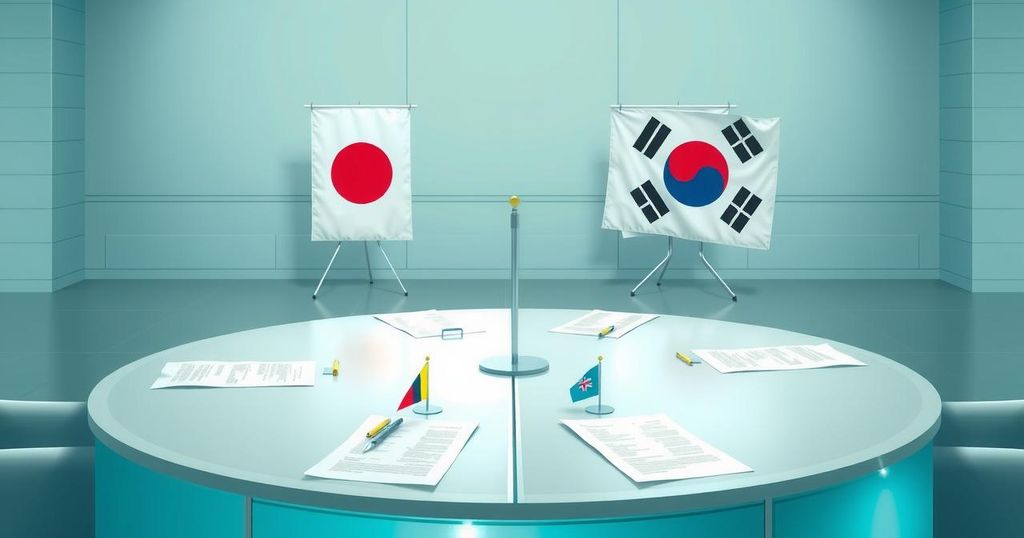Ukraine and South Korea Discuss Repatriation of North Korean Soldiers

South Korea and Ukraine are negotiating the potential repatriation of two North Korean soldiers captured during the Ukraine-Russia conflict. South Korean Foreign Minister Cho Tae-yul emphasized the significance of the soldiers’ willingness to seek asylum for their repatriation. The situation is complicated by North Korea’s military support for Russia and the humanitarian implications of accepting defectors from the North.
On March 17, 2025, diplomats from South Korea and Ukraine convened to discuss the repatriation of two North Korean soldiers captured in the ongoing conflict between Ukraine and Russia. During these discussions, South Korean Foreign Minister Cho Tae-yul engaged with his Ukrainian counterpart, Andrii Sybiha, emphasizing that, as per South Korea’s Constitution, North Koreans are regarded as South Korean citizens, provided they express a desire to relocate. Their willingness to seek asylum is therefore crucial for their potential repatriation.
The negotiations were prompted by North Korea’s increased troop deployment to support Russian military efforts, particularly amidst reported manpower shortages on Russia’s side. Approximately 12,000 North Korean troops were sent to support operations in Russia’s Kursk Oblast last fall, contributing to severe casualties among their ranks—over 4,000 soldiers were reportedly injured, with two-thirds presumed killed, as indicated by Ukrainian President Volodymyr Zelensky.
Ukraine captured the two soldiers on January 11, 2025, representing the first instance in which North Korean personnel were both captured alive and subsequently received medical care under Ukrainian custody. This is a continuation of tensions as two weeks prior, another North Korean soldier died from injuries sustained in combat shortly after being taken prisoner.
Seoul has demonstrated an ongoing commitment to North Korean affairs, accepting around 34,000 defectors since the late 1990s, establishing a historical precedent for this situation. However, engaging in the repatriation negotiations holds diplomatic risks, as it could bolster South Korea’s humanitarian image but simultaneously disturb its relationships with both North Korea and Russia. Cho’s decision relies on the captured soldiers’ expressed intentions, which, as per the National Intelligence Agency, had not been indicated as of January, complicating the circumstances of their potential resettlement.
Amid these developments, North Korean forces have reportedly engaged significantly on the frontlines, as highlighted by Ukrainian official Andriy Kovalenko, who noted their aggressive tactics in assaults. This acknowledgment raises security concerns for neighboring countries and illustrates the dangers faced amid the conflict. Analysts attribute the high casualty rates among North Korean troops to their inexperience in combat, leading to disastrous outcomes.
Sybiha addressed the partnership with South Korea on social media platform X, expressing the need for a cooperative approach to counteract the collaboration between Russia and North Korea, which poses threats to regional security. However, the soldiers’ intent to relocate remains unclear, possibly indicating their hesitation to become strategic pawns in international negotiations.
Moreover, dissenting voices have emerged amid the discussions. Yeonmi Park, a North Korean defector, criticized Ukraine on social media for allegedly linking the prisoners’ repatriation to arms trading, posing a challenge to humanitarian motives. President Zelensky elucidated the complexities surrounding the capture, remarking on the risks faced by his soldiers when confronting North Korean forces, who often execute their wounded to conceal their involvement.
The future of these negotiations may significantly affect not only the fate of the captured soldiers but also the geopolitical landscape. North Korea’s current silence on the matter adds another layer to the intricate, long-standing relationship characterized by tension and the ongoing struggle to navigate humanitarian concerns amid conflict.
The discussions between South Korea and Ukraine regarding the repatriation of North Korean soldiers underscore a complex interplay between humanitarian efforts and geopolitical strategies. The willingness of the captured soldiers to seek asylum may serve as a determining factor in these negotiations, which could have ramifications for inter-Korean relations and regional security. The evolving situation continues to reflect broader strategic considerations amidst ongoing warfare and international dynamics.
Original Source: evrimagaci.org








